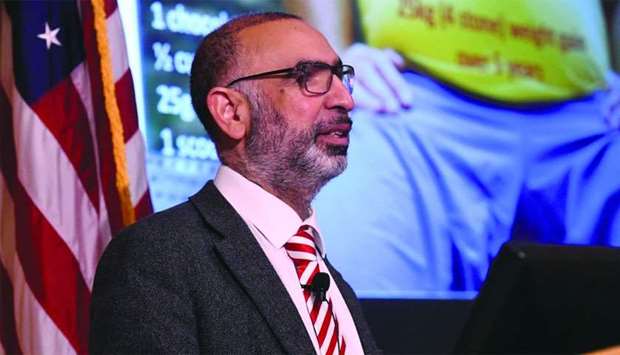Obesity is one of the greatest health challenges of the modern era, explained professor of medicine Dr Shahrad Taheri at Weill Cornell Medicine-Qatar’s (WCM-Q) latest Grand Rounds lecture.
Dr Taheri displayed recent figures showing that 21.5% of children in Qatar aged 5-19 years are obese, a level that he says is all the more concerning because research has shown that most children tend not to outgrow obesity, but instead carry it into adulthood.
Speaking at Grand Rounds to an audience of students and fellow health professionals, he said, “We are in a region where we have some of the highest levels of overweight and obesity in the world - 76.6% of people are overweight or obese and 42% are obese. What is most alarming is the prevalence of obesity in children. The high prevalence of obesity in adults and children in Qatar are comparable to those observed in some regions of the United States.”
Dr Taheri said, “We know very clearly that people who are obese lose years from their life. If someone is obese at the age of 40, they will lose six to seven years of life. If they are obese and they smoke it can be estimated that they will likely live 13 to 14 years less than normal weight non-smokers.
“Obesity is one of the greatest health challenges that we are facing as healthcare professionals and as a society.”
Complications of obesity such as diabetes, cardiovascular disease and cancer add to the reduced longevity caused by obesity, he said. Dr Taheri then went on to explain that obesity should be considered a chronic disease that requires lifelong management to keep it under control. He also discussed the most effective means for the management of obesity, including weight loss strategies, weight loss maintenance, bariatric surgery and various forms of medication. Dr Taheri stressed that both low-carbohydrate and low-fat diets can lead to significant weight loss of 6-7 kg after 12 months, but also that there was little clinical difference between the results produced by following various different well-known named diets.
“Early weight loss is the key,” said Dr Taheri. “Those who demonstrate early weight loss are the most likely to succeed in the long-term. If someone has lost ten percent of their body weight in the first year, they are 10.4 times more likely to have maintained that weight loss after four years.”
Patients who manage to achieve significant long-term weight loss have vastly improved healthcare outcomes, said Dr Taheri. There is now evidence that type 2 diabetes can be reversed by adopting positive lifestyle behaviours such as eating a healthy diet, increasing physical activity and losing weight.

